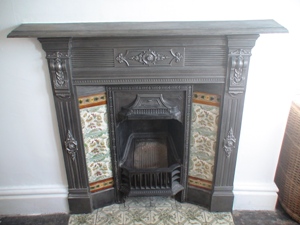
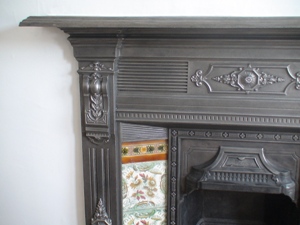
One of the best purchases that Ross and I have made this year has been the summer duvet that we bought in Southport in the spring.
It has served us well. It helped Ross get through the warmer months without feeling overheated in the night. And, with the addition of a fleece on my side of the bed, it has stood us in good stead through the autumn up until now. Now, high pressure has brought clear skies and, at last, colder nights. We have been somewhat cossetted by very mild overnight conditions so far.
Still times pass and it was inevitable that the winter duvet would come out of its bag at some point. Nutkin and Jemima think that it is wonderful. They like its thick bounciness; they like sinking into its embrace when they curl up for an early evening nap. I must also report that they have both re-acquired their winter coverings. Jemima's fur is particularly fine and luxuriant in this her third winter. Nutkin has his full ruff and woolly jodhpurs.
I've been off on holiday this week and I've been taking it easy, sleeping in and not being too worried about seeing the dawn. Together Ross and I have made some real progress with the decorating. Ross has completed work on the fireplace which does look good. I've got all of the filling and sanding and cleaning done. Now, we are underway with the enjoyable papering and painting part of the job.


It's not been all work. I've spent time in the garden, moving and thinning. We've been out swimming and eating. I've listened to music and read books.
I tried but gave up on Christopher Brookmyre's Country of the Blind. Labelled as Tartan Noir, I was happy to accept the conventions of hard-boiled Los Angeles detectives as applied to investigative journalism in Glasgow. What I was not willingly able to accept was a plot that revolved around the Secretary of State for Scotland employing a licensed assassin to murder an inconveniently powerful businessman. There's only so far within the bounds of credulity that my suspension of disbelief is capable of wandering.
 What I did like was the new Pratchett novel - Making Money. We return to the world of Moist von Lipwig whom we first encountered in Going Postal. Oh, I have to admit that the story this time was pretty much a re-hash of the story from last time. But it's a good story and I like Pratchett's sense of humour.
What I did like was the new Pratchett novel - Making Money. We return to the world of Moist von Lipwig whom we first encountered in Going Postal. Oh, I have to admit that the story this time was pretty much a re-hash of the story from last time. But it's a good story and I like Pratchett's sense of humour.
![]()
Elsewhere, it's been a week of opera as Welsh National Opera have been in residence at the Liverpool Empire. It's been nearly two and a half years since I last stepped inside the place for Wozzeck. Recently, Ross and I have not been to any ballet there and, for opera, we've tended to Salford Quays for Opera North, the Buxton Festival and Llandudno for Welsh National Opera. This year, I thought that I should make things easier and cheaper for myself.
It kicked off on Tuesday when I met up with Colin in town for a bite to eat before heading off for the fourth performance ever of The Sacrifice by James MacMillan. My track record of attending new work over the past decade or more is not good. Once upon a time it was a badge of honour to attend anything that was new. Then I got to feel that I was enduring rather than enjoying those evenings and so I stopped going.
James MacMillan is a composer whose work I've heard on the radio and have liked. I'd listened to this work on Radio 3 on Saturday night in the Opera on 3 slot. It sounded good. Real tunes. Real set pieces. I was looking forwards to it.
In the event the whole experience was scuppered by Katie Mitchell's production. As noted before, everything that she does seems to be set in the 1950s. This was supposed to be set in the future. However, the costumes were 1950s whilst the hotel design was bad Soviet 1970s. To make it futuristic, people videoed events with contemporary equipment which was, in production terms, eighty years old. All of this achieved nothing. The story was taken out of the Welsh epic, the Mabinogion. Why the piece could not have been set in a mythic twilight so that we could all see the relevance to varied troublespots around the world I do not know?
And another thing, if we were supposed to be dealing with two warring tribes, then why was there nothing to signify this on stage. Everyone wore ordinary clothes. There was no military feel. there was no colour coding for the tribes. Oh, I could go on.
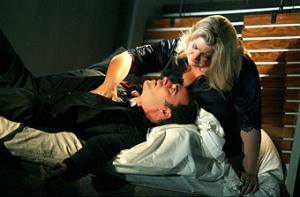 And it's a pity because the performances were good. I liked the three principals Leigh Melrose, Lisa Milne and Christopher Purves. But, although I'd love to reward endeavour, I can't really rise to more than two stars for this. It really had worked better on the radio.
And it's a pity because the performances were good. I liked the three principals Leigh Melrose, Lisa Milne and Christopher Purves. But, although I'd love to reward endeavour, I can't really rise to more than two stars for this. It really had worked better on the radio.
![]()
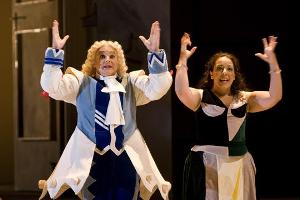 The following night brought a new production of Rossini's La Cenerentola. The last time that I saw this work was on New Year's Day 2001. It was the first time that I heard Juan Diego Flórez sing. Colin Bell took the same rôle on this occasion and did it all very well, a couple of top notes aside. He's due to sing Count Almaviva in Il barbiere di Siviglia for Welsh National Opera in a year or so - I'll be quite happy to hear him sing again.
The following night brought a new production of Rossini's La Cenerentola. The last time that I saw this work was on New Year's Day 2001. It was the first time that I heard Juan Diego Flórez sing. Colin Bell took the same rôle on this occasion and did it all very well, a couple of top notes aside. He's due to sing Count Almaviva in Il barbiere di Siviglia for Welsh National Opera in a year or so - I'll be quite happy to hear him sing again.
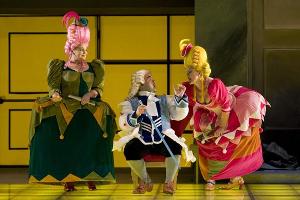 Mariana Pizzolato was the Cenerentola and she was also very good. Our two ugly sisters, Joanne Boag and Julianne Young, were well delineated. Thereafter, things were less happy. Robert Poulton's Don Magnifico was not out of the top drawer. I have been spoilt with hearing the likes of Simone Alaimo and Alessandro Corbelli in La Cenerentola, Don Pasquale and La Fille du Régiment.
Mariana Pizzolato was the Cenerentola and she was also very good. Our two ugly sisters, Joanne Boag and Julianne Young, were well delineated. Thereafter, things were less happy. Robert Poulton's Don Magnifico was not out of the top drawer. I have been spoilt with hearing the likes of Simone Alaimo and Alessandro Corbelli in La Cenerentola, Don Pasquale and La Fille du Régiment.
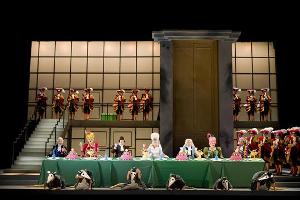 The overall production by Barcelona-based Joan Font was vivid and well-paced. It will be seen at the Liceu with Snr Flórez. I'm sure that it will look very handsome there and will go down well. Carlo Rizzi conducted. I missed some of the nervy zip that Mark Elder obtained back in 2001 but it still sounded well. It was good.
The overall production by Barcelona-based Joan Font was vivid and well-paced. It will be seen at the Liceu with Snr Flórez. I'm sure that it will look very handsome there and will go down well. Carlo Rizzi conducted. I missed some of the nervy zip that Mark Elder obtained back in 2001 but it still sounded well. It was good.
![]()
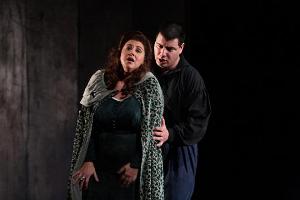 Finally, we fetched up at Il Trovatore by Verdi which myself, Colin and Roland attended. Ross and I had already seen this production in Llandudno in 2003 and another production of the work itself at Royal Opera in 2002. Of the three, this was the most enjoyable. There were two stand out performances - Katia Pellegrino's Leonora and Dario Solari's Count di Luna. Both sang with exemplary beauty of tone and length of line. You don't often hear legato like that in Verdi these days.
Finally, we fetched up at Il Trovatore by Verdi which myself, Colin and Roland attended. Ross and I had already seen this production in Llandudno in 2003 and another production of the work itself at Royal Opera in 2002. Of the three, this was the most enjoyable. There were two stand out performances - Katia Pellegrino's Leonora and Dario Solari's Count di Luna. Both sang with exemplary beauty of tone and length of line. You don't often hear legato like that in Verdi these days.
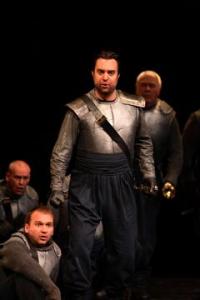 I also liked David Soar's Ferrando. Anne-Marie Owens was probably too nice to play the crazed gypsy, Azucena, but did sing well in the ensembles. It was Luis Chapa's first night as Manrico; he did well but was nearly scuppered by the conductor, Snr Rizzi again, in Di quella pira. Big tunes, an unhinged plot, full-throated singing. It was good, very good.
I also liked David Soar's Ferrando. Anne-Marie Owens was probably too nice to play the crazed gypsy, Azucena, but did sing well in the ensembles. It was Luis Chapa's first night as Manrico; he did well but was nearly scuppered by the conductor, Snr Rizzi again, in Di quella pira. Big tunes, an unhinged plot, full-throated singing. It was good, very good.
![]()